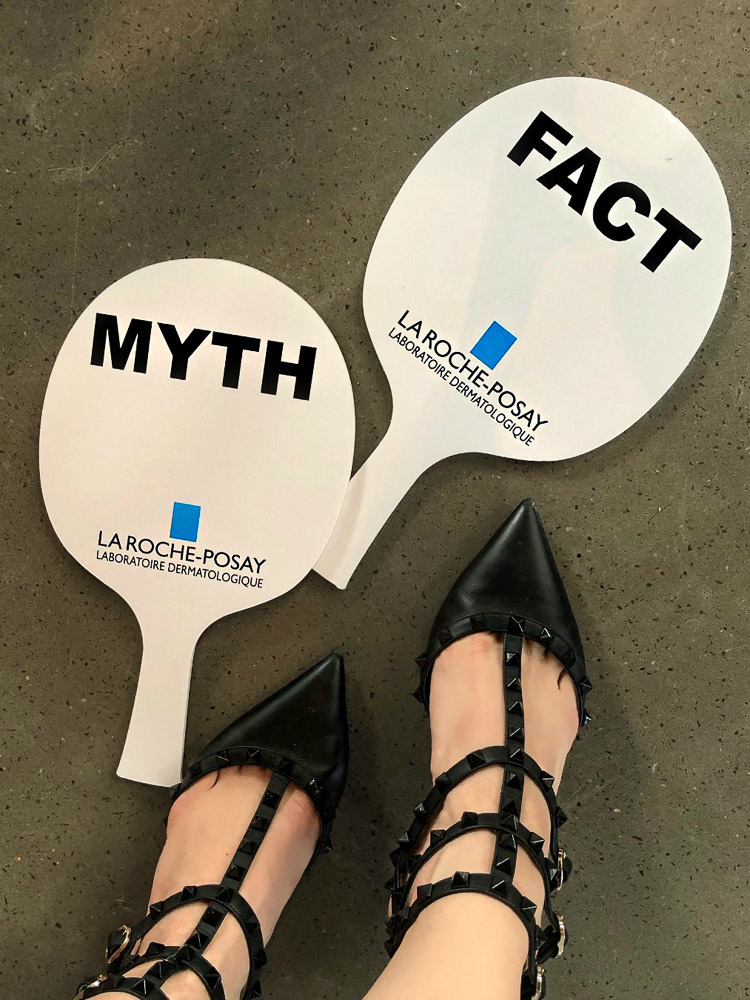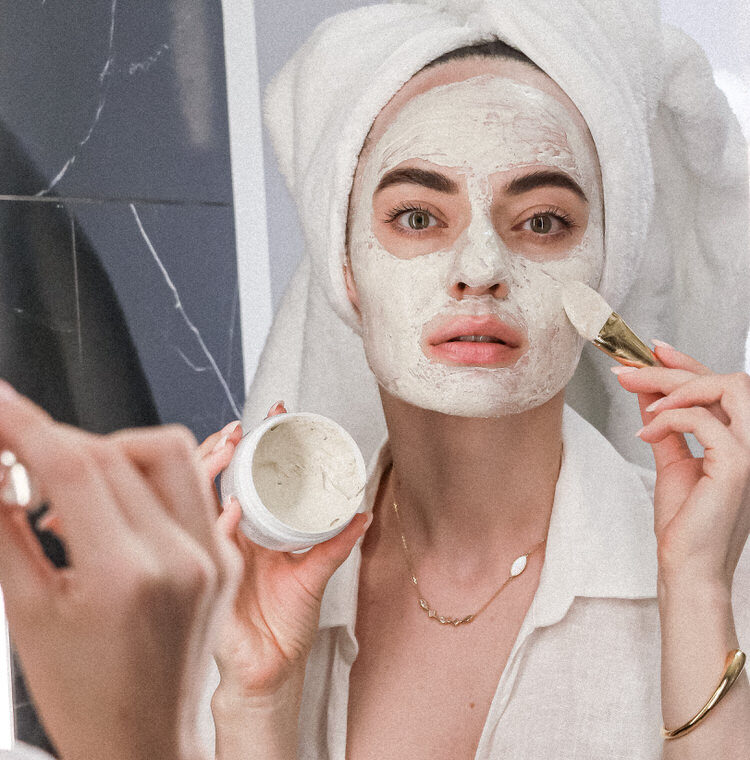
It’s doable to keep adult acne under control. But it requires a dedicated effort. In this post, I share three acne myths and debunk them with the help of La Roche-Posay.
It’s becoming a tradition for me to attend (my favorite!) La Roche-Posay Acne DermClass — and every time I’m there, I learn SO much and can’t wait to share with you. Being an adult (most importantly, a beauty blogger!) with acne-prone skin is no fun… But with the help of Board-Certified Dermatologists that La Roche-Posay collaborates for such events, learning how to keep adult acne under control is doable.
And this time, they had TWO dermatologists present. Dr. Baldwin, a board-certified dermatologist, shared with us how acne forms, treatment options for the different types of acne, and the importance of maintaining a consistent skincare routine. Then, Dr. Rieder, who is only one of three board-certified dermatologists and psychiatrists in the US, shared with us the long-term impact of acne from a psychological, social, and emotional perspective.
There is no cure for can because, based on certain life situations that I mention below, acne could be easily re-activated or appear more prominently. However, having the education, treatment options, and skincare routine can help manage acne severity. People don’t believe it’s possible to make your acne less severe.
I managed to keep mine tamed to the point that I have to keep my “before” photos always ready as proof that I used yo have severe acne.
Trust me when I say that getting acne-free is not an easy process — but with the help of professionals and tons of free, scientifically proven information provided by companies like La Roche-Posay, it’s possible!
Today, I’d like to concentrate on some of the key points that I learned at the La Roche-Posay AcneDerm Class that were surprising discoveries even for me, an experienced acne fighter. These are bits of information from the panel discussion with Hilary Baldwin, MD, and Evan Rieder, MD, that forced me to reconsider some of the acne beliefs that I had too.

Myth #1: Only People with Oily Skin Can Have Acne
Based on the fact that my acne usually comes out on my cheeks where I have dry skin and not my T-zone where my skin is oily, I already knew about this myth. But you’ll be surprised how often I hear in conversation with readers that they are getting acne because their skin is too oily! It’s a myth! You can have any skin type and still have acne.
Dr. Baldwin also mentioned that there’s a distinction between dry and dehydrated skin. Dry skin is a natural state of your skin when it just doesn’t produce as much oil as other types. Contrary, dehydrated skin is a condition that you knowingly or unknowingly put your skin through. Too much exfoliation, avoidance of moisturizing your skin, not drinking enough water, too much time on the sun, harsh skin care products that don’t work for your skin — these are just some of the reasons you can have dehydrated skin.
Dry Skin vs. Dehydrated Skin
Dehydrated and dry skin types with acne require different treatment approaches. In case of dehydrated skin, you’d need to repair your skin barrier first (and put acne treatment on hold until your skin is heeled) and only after that address the acne situation. Otherwise, your skin will be too irritated and sensitive to use acne medications.
Dry skin type is also more difficult to treat from acne than, let’s say, oily skin. Naturally thinner and more sensitive, dry skin requires a more gentle approach when treating acne than oily skin. But with the help of an experienced dermatologist, it’s possible to get your dry skin acne-free. Hey, I have dry skin too, and somehow I managed to keep my acne under control — you can do it too!

Myth #2: Acne Is All About Skincare, Not Your Diet
This one I’ve been mentioning ever since attending my first La Roche-Posay Acne DermClass, and no one seemed to believe me. Well, some people mentioned it in a non-scientific way (like me, saying that going vegan for a while saved my skin). But it was the first time I’ve heard from actual dermatologists that your lifestyle choices do impact how your skin looks and whether you have severe acne.
At the Acne DermClass, Dr. Hilary Baldwin and Dr. Evan Rieder discussed how consuming skim milk product impact a person’s skin. They specifically touched on the skimmed and low-fat milk products. As it turned out, these products are processed, and they don’t seem to work well for people with acne-prone skin. On my personal experience, that was a breaking point for changing my skin! I did cut every single milk product from my diet and immediately noticed the difference in clarifying my acne.
Dr. Baldwin provided an example of clients who consumed whey protein also seemed to be less successful with traditional acne treatments like benzoyl peroxide and even adapalene.
That was quite a revelation for me, and I immediately scrolled through every ingredient in my protein bars looking for whey protein. Guess what, some of my favorite protein-based snacks did have whey powder in them! Thanks to the DermClass, these potentially acne-provoking snacks are out for my life for good.

Myth #3: Acne and Stress? Not Related!
Another critical problem that doctor Evan Rieder mentioned is the connection between acne and stress. We usually talk about this topic from the perspective that people with acne-prone skin don’t feel confident about their looks. But there’s more to it! Recent studies are showing that when you are under stress, your skin looks worse than when you are at peace.
Dr. Rieder recommended all sorts of self-care rituals that help to escape this vicious circle, from meditation to talking to a therapist. If you are interested in learning more about how to handle your everyday stress, check out my recent post on easy self-care rituals that help me to stay positive and less stressed out.
As a person who’s been struggling with acne-prone skin all her life, I agree that the acne problem demands a particular approach. From boosting your self-confidence and improving your eating habits and consulting with the dermatologist, it’s quite a long-term project. But, again, it’s doable, especially with an organized and straightforward approach.
* * * * *
I hope this portion of myths about acne debunked was helpful. As always with La Roche-Posay, I learned so much at the Acne DermClass. I hope I succeeded in presenting my knowledge in an easy to comprehend way. Kindly let me know in the comments if you have questions about how to handle acne-prone skin. Thanks for reading!
Disclosure: La Roche-Posay sponsored this post.





